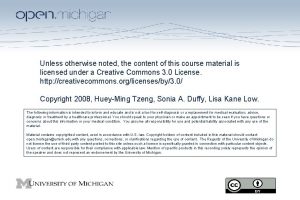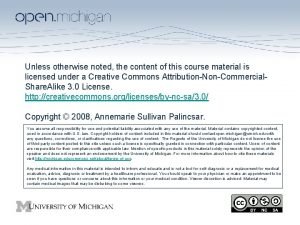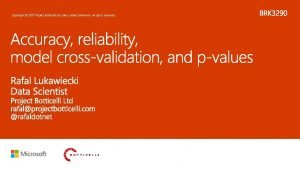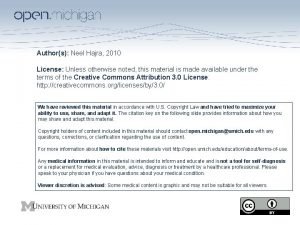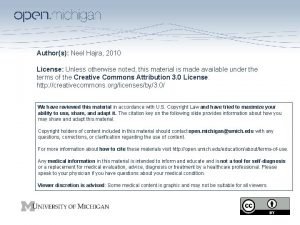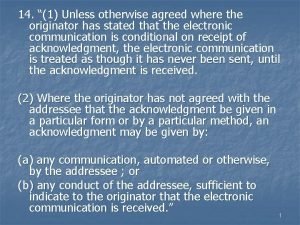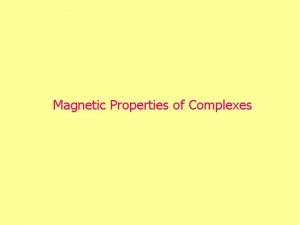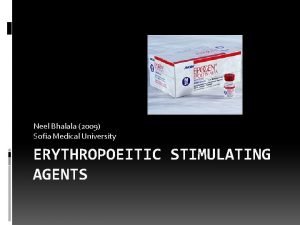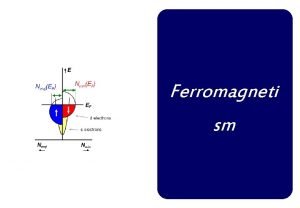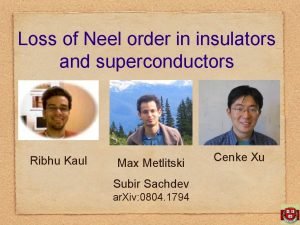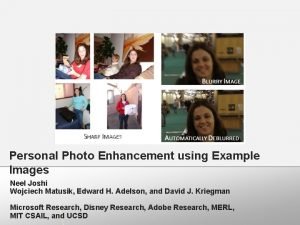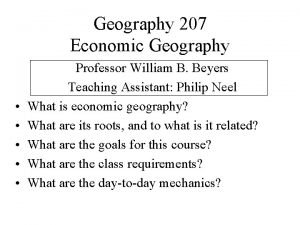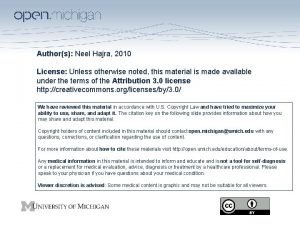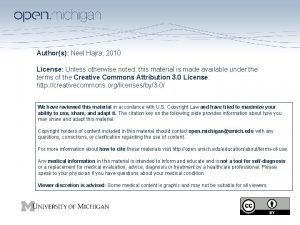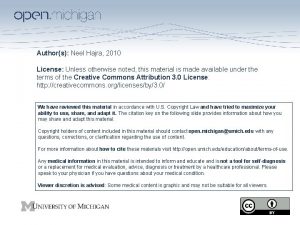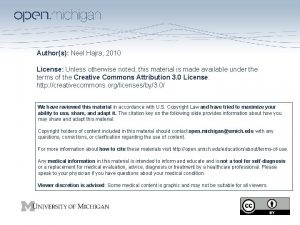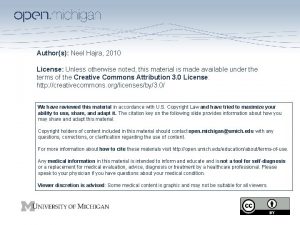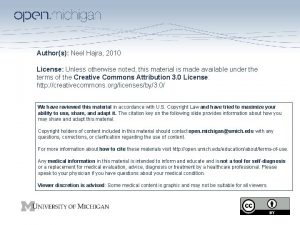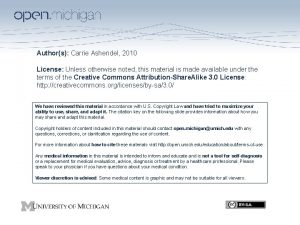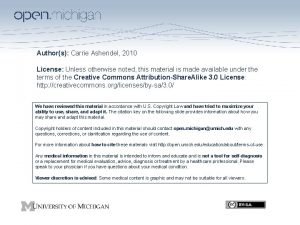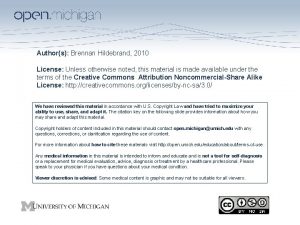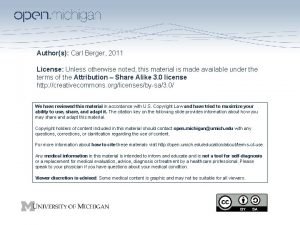Authors Neel Hajra 2010 License Unless otherwise noted

















- Slides: 17

Author(s): Neel Hajra, 2010 License: Unless otherwise noted, this material is made available under the terms of the Creative Commons Attribution 3. 0 License: http: //creativecommons. org/licenses/by/3. 0/ We have reviewed this material in accordance with U. S. Copyright Law and have tried to maximize your ability to use, share, and adapt it. The citation key on the following slide provides information about how you may share and adapt this material. Copyright holders of content included in this material should contact open. michigan@umich. edu with any questions, corrections, or clarification regarding the use of content. For more information about how to cite these materials visit http: //open. umich. edu/education/about/terms-of-use. Any medical information in this material is intended to inform and educate and is not a tool for self-diagnosis or a replacement for medical evaluation, advice, diagnosis or treatment by a healthcare professional. Please speak to your physician if you have questions about your medical condition. Viewer discretion is advised: Some medical content is graphic and may not be suitable for all viewers.

Citation Key for more information see: http: //open. umich. edu/wiki/Citation. Policy Use + Share + Adapt { Content the copyright holder, author, or law permits you to use, share and adapt. } Public Domain – Government: Works that are produced by the U. S. Government. (USC 17 § 105) Public Domain – Expired: Works that are no longer protected due to an expired copyright term. Public Domain – Self Dedicated: Works that a copyright holder has dedicated to the public domain. Creative Commons – Zero Waiver Creative Commons – Attribution License Creative Commons – Attribution Share Alike License Creative Commons – Attribution Noncommercial Share Alike License GNU – Free Documentation License Make Your Own Assessment { Content Open. Michigan believes can be used, shared, and adapted because it is ineligible for copyright. } Public Domain – Ineligible: Works that are ineligible for copyright protection in the U. S. (USC 17 § 102(b)) *laws in your jurisdiction may differ { Content Open. Michigan has used under a Fair Use determination. } Fair Use: Use of works that is determined to be Fair consistent with the U. S. Copyright Act. (USC 17 § 107) *laws in your jurisdiction may differ Our determination DOES NOT mean that all uses of this 3 rd-party content are Fair Uses and we DO NOT guarantee that your use of the content is Fair. To use this content you should do your own independent analysis to determine whether or not your use will be Fair.

Pub. Pol 671: Policy & Management in the Nonprofit Sector Lecture 21: Social Enterprise continued Neel Hajra

Next Week Monday: Guest lecture by Kevin Thompson (updated readings in syllabus) Wednesday: Wrap up social enterprise, examine future relationship of nonprofit and for-profit sectors

Final Paper Topic to be released later this week Due Thursday, April 29 at midnight (last day of exams period)

LET’S LIVE THE DREAM!

Ground Rules A “management” exercise that sheds light on the real challenges of social enterprise Work FAST Solid Note-taking – please submit to Neel by end of this week We’ll examine and discuss your collective experiences and results next week Your results will be shared with class

Step 1: Describe Your Services In More Detail What kinds of services do you offer? (don’t forget your mission and metrics) What is the scope of your services (#’s, geography, etc. ) Who participates in your services? TIME: 10 minutes

Step 2: Describe Your Funding Sources Assume you receive funding from all four common sources (individual, corporate, foundation, local government) and no earned income Assign a percentage of total support for each source (try to reflect what you think would be typical for an organization like yours) TIME: 5 minutes

Step 3: Build an Org Chart for Your Nonprofit Positions in addition to Board and Executive Director Salary for each position Responsibilities for each position $250 k in total salary

Step 3 Examples Typical functions: Program delivery Strategic management Financial management Fundraising Marketing/outreach I. T. (e. g. , computer systems, phone systems, websites, etc. ) H. R. (e. g. , hiring, payroll, policies, benefits, volunteer management, etc. ) TIME = 10 minutes

OH SNAP… You project a major loss in funding!

Step 4: Formulate a social enterprise model for your organization What activities can generate earned revenues? Who are your customers? What sort of fees and fee structure will you use? What percentage (minimum 50%) of your expenses do you hope to cover through your earned income? TIME: 15 minutes

Step 5: Identify what changes to your org structure are necessary to support your new business model Do you need new staff/skills? Do you need to re-assign or eliminate existing staff/skills? What about your board? What about your volunteers? Estimate the cost difference (if any) between your old org chart and your new one TIME: 10 minutes

Step 6: Identify what changes to your infrastructure are necessary to support your new business Facilities Communications I. T. systems and software Etc. TIME: 10 minutes

Step 7: Identify what changes to your donor (investor) base are necessary to support your new business Do you need more or new kinds of supporters? Will you retain existing supporters? What you need different levels or kinds of support? TIME: 5 minutes

Step 8: Identify any other steps you need to take to effect the conversion to a social enterprise model Coordinating with stakeholders? Planning? Changing internal culture? Training? Marketing and Communications? And many other potential areas… TIME: 5 minutes
 Unless otherwise noted meaning
Unless otherwise noted meaning Unless otherwise noted meaning
Unless otherwise noted meaning Unless noted otherwise
Unless noted otherwise Neel hajra
Neel hajra Neel hajra
Neel hajra Unless otherwise agreed
Unless otherwise agreed Robert neel md
Robert neel md Neel order
Neel order Difference between curie temperature and neel temperature
Difference between curie temperature and neel temperature Neel bhalala
Neel bhalala Difference between curie temperature and neel temperature
Difference between curie temperature and neel temperature Ferromagneti
Ferromagneti Mst
Mst Neel sachdev
Neel sachdev Benjamin burnham sea of poppies
Benjamin burnham sea of poppies Neel joshi md
Neel joshi md Philip neel
Philip neel Cristen chin
Cristen chin
